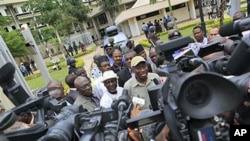Nigeria is restructuring security services to better combat a series of terrorist attacks. There is growing concern that the violence is not limited to any one group.
Nigerian President Goodluck Jonathan says violence in the capital and across northern states is not exclusively the work of Islamic fundamentalists from a group known as Boko Haram.
That group claimed responsibility for last month's bombing of United Nations headquarters in Abuja, which killed 23 people. President Jonathan said, though, he believes there are other “unpatriotic elements” at work as well, and vows there will be “no sacred cows” in the drive to expose them, no matter where they are hiding.
Beyond Boko Haram
Retired Lieutenant General Jeremiah Useni heads a prominent group of religious and political leaders in northern Nigeria, under the Arewa Consultative Forum. He said the military's inability to contain the threat reveals a security challenge deeper than Boko Haram alone.
"Every time an incident occurs, we will be told there is a warning to security or there was a warning somewhere, and security was aware of it. And yet the thing still happened. Which means that either security does not believe the sources of this information or there is laxity somewhere,” said Useni.
Speculation about who might be hiding behind this violence includes al-Qaida-affiliated terrorists from the Sahel, political opponents of President Jonathan and even members of Nigeria's military, who may want to discredit civilian rule.
Culture of terror
Abubakar Umar Kari, who lectures in sociology at the University of Abuja, said, "Unfortunately, the Boko Haram has virtually become a metaphor for terrorism and violence in Nigeria. Any attack, any serious breach of security or peace is easily ascribed to Boko Haram."
Kari said the do-or-die nature of Nigerian politics breeds extremism.
"The politics of Nigeria has become such a very serious affair," he said. "Contestation of power within the Nigerian ruling elite [is such] that one cannot rule out the possibility that a section of the elite who feel shortchanged or out of the saddle would try to sponsor the kind of terror that we are now saying is the work of Boko Haram. But some of these attacks are clearly not the handiwork of Boko Haram."
Dissatisfaction with status quo
Human rights activist Shehu Sani writes extensively on Boko Haram. He said amnesty for militants in the oil-rich Niger Delta opened the way for armed insurgents across the north.
"This use of money to appease people who pick up arms made it very easy for other people to say, 'For me to be listened to, I [must] also pick up arms.'"
He said other groups are tapping into the popular dissatisfaction that has fueled Boko Haram's recruiting.
"Even though people in the north are not outwardly in support of [Boko Haram], people [inwardly, privately] see them as a response to the years of plunder and exploitation to which the political leadership of Nigeria has subjected its people,” said Sani.
Jonathan said he is changing the architecture of security services to improve intelligence gathering. He also said the government is making better use of surveillance by civilians to punish those who would terrorize Nigerians.




